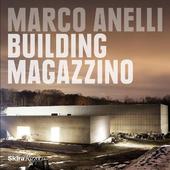
|
Marco Anelli: Building Magazzino
Hardback
Main Details
| Title |
Marco Anelli: Building Magazzino
|
| Authors and Contributors |
By (author) Marco Anelli
|
|
By (author) Vittorio Calabrese
|
| Physical Properties |
| Format:Hardback | | Pages:152 | | Dimensions(mm): Height 254,Width 254 |
|
| Category/Genre | Photography and photographs |
|---|
| ISBN/Barcode |
9780847861019
|
| Classifications | Dewey:069.09747 |
|---|
| Audience | |
|---|
| Illustrations |
90 colour photographs
|
|
Publishing Details |
| Publisher |
Rizzoli International Publications
|
| Imprint |
Skira Rizzoli
|
| Publication Date |
1 December 2017 |
| Publication Country |
United States
|
Description
The transformation and expansion of a 1960s factory building in Cold Spring, NY to house an extraordinary art collection has been documented by Marco Anelli, Magazzino Italian Art s first artist in residence. From initial excavations to the installation of artworks in the galleries, Anelli traces Spanish architect Miguel Quismondo s plan to create a space that bridges the artistic legacy of the Hudson Valley with the demands of ambitious contemporary artworks. Several essays and examples of founders Nancy Olnick and Giorgio Spanu s stunning Italian art collection enliven Anelli s series of landscape photographs and portraits. Exhibition Schedule: Italian Cultural Institute of New York: October 4 November 2, 2017
Author Biography
Marco Anelli s publications include works on sculpture and architecture. Vittorio Calabrese is the director of Magazzino Italian Art. Nancy Olnick and Giorgio Spanu are the co-founders of Magazzino Italian Art. Manuel Blanco is an architect, curator, and professor at the School of Architecture of Madrid (ETSAM). Alberto Campo Baeza is an architect and professor at ETSAM. Marvin Heiferman is an American curator and writer.
Reviews"Reputable Italian photographer Anelli pays homage to the new Italian Art exhibition in Cold Spring, NY, known as Magazzino, through an intimate and thorough photoshoot of the installation's construction. The book celebrates the workers that brought the gallery to life while also serving as the gallery's first feature, and captures the sleek, modern and geometric exhibition dwarfed by the ancient Hudson Valley landscape." -Town & Country
|